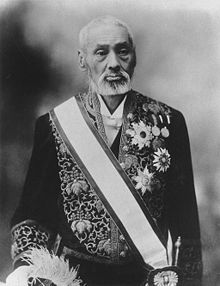Katō Hiroyuki
Katō Hiroyuki | |
|---|---|
 Count Katō Hiroyuki | |
| Born | August 5, 1836 |
| Died | February 9, 1916 (aged 79) Tokyo, Japan |
| Nationality | Japan |
| Occupation(s) | Educator, Legal Scholar |
Baron Katō Hiroyuki (加藤 弘之, August 5, 1836 – February 9, 1916) was an educator, statesman and leader of the “Meiji Enlightenment” in Meiji period Japan.
Biography
Katō was born to a samurai family in Izushi domain, Tajima Province (present day Hyōgo Prefecture), and studied military science under Sakuma Shōzan and rangaku under Oki Nakamasu in Edo. As an instructor at the Tokugawa bakufu's Bansho Shirabesho institute for researching Western science and technology from 1860-1868, he was one of the first Japanese to study German language and German philosophy.
After the Meiji Restoration, Katō wrote numerous theses recommending Japanese adoption of Western forms of government, especially that of a constitutional monarchy with a national assembly based on representative democracy. He joined the Rikken Seiyūkai political party, and was also a founding member of the Meirokusha intellectual society organized by Mori Arinori. A strong believer in social Darwinism, he drew parallels a democratic government and the natural order. As a member of the Genroin, he strongly supported Statism, a much more authoritarian version of government against the views propounded by the Freedom and People's Rights Movement.
Katō gave lectures to Emperor Meiji each week on constitutional and international law, using translations from western texts to explain the concept of separation of powers between executive, legislative and judiciary branches of government, the history of constitutions in Europe, and various forms of local administration. [1]
Katō served as superintendent of the Departments of Law, Science, and Literature of Tokyo Imperial University from 1877-1886, and again as president from 1890-1893, and was head of the Imperial Academy from 1905-1909. He was also a special adviser to the Imperial Household Agency.
Katō was appointed a member of the House of Peers in 1890, and was ennobled with the title of danshaku (baron) under the kazoku peerage system in 1900. In addition, he became a Privy Councilor.
References and further reading
- ^ Keane. Emperor of Japan, Meiji and His World. Pages 176-177
- Davis, Winston. The Moral and Political Naturalism of Baron Kato Hiroyuki. Institute for East Asian Studies, June 1996. ISBN 1-55729-052-0.
- Keane, Donald (2005). Emperor Of Japan: Meiji And His World, 1852-1912. Columbia University Press. ISBN 0-231-12341-8.
- Jansen, Marius B. The Making of Modern Japan. Belknap Press; New Ed edition (October 15, 2002). ISBN 0-674-00991-6
